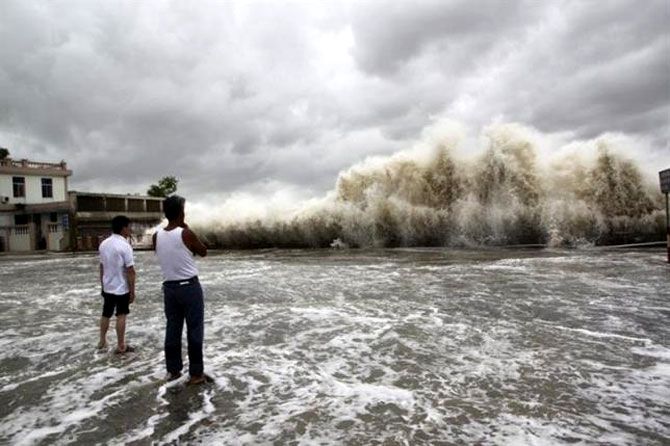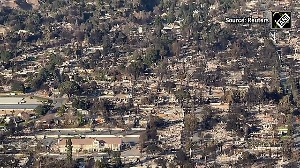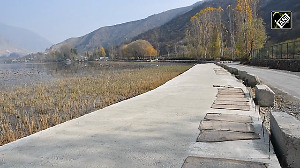
What disappoints Ghosh is the failure of policy makers in preparing for impacts of climate change which are already affecting us.
Novelist and essayist Amitav Ghosh, below, left, had his first brush with climate change during a stroll near Delhi University's North Campus over three decades ago.
A freak tornado tore through the streets of the national capital in March 1978 taking nearly 30 lives and injuring hundreds, a calamity he claims to have escaped by the skin of his teeth.
Now nearly 38 years after the experience he terms as surreal, Ghosh examines the failures of literature, history and politics in addressing the most pressing challenge of our times in his second non-fiction The Great Derangement- Climate Change and the Unthinkable.'
The author is not exactly treading new waters here -- it is an issue which has always been an "obsession" with him, one which he dealt with obliquely in his sixth novel The Hungry Tide.
Although the fiction addressed topics like erosion in the Sundarbans, it also opened his eyes to some of the issues that arise when one tries to write about climate change within the bounds of a work of fiction.
"You are forced to tackle things that don't normally figure in a novel.
Things like geology, continental drift etc. So I had to grapple with this -- Why I want to write about the things I really want to write within fiction. I questioned the boundaries of the novel. . .," he told PTI in an interview.
Although there was "some tension" switching tracks from historical fiction to non-fiction, the ideas simply "poured out of him" while writing his latest, as he says he had been "obsessively reading about it for years".
Recalling the fateful March evening, Ghosh wonders whether it was that extreme weather phenomenon that perhaps got him thinking about climate change.
"I heard a noise and I looked over my shoulder, and I saw this strange cloud. And suddenly this sort of long finger seemed to come out of the cloud straight down towards me.
"I had the presence of mind that I ran, and took shelter.
"Suddenly I looked up and I saw things hurtling past me. Like tea stalls, and cars and scooters. It lasted for about a moment.
"It seemed completely surreal," he describes.
Ghosh's book is an urgent call to arms on the most alarming issue in front of humanity.
Despite climate change being an intrinsic part of life he finds it befuddling that it has managed to garner very little resonance in works of entertainment and literature.
"It is not just novelists who find climate change hard to think about. It is journalists as well as non-fiction writers.
"The novelist's dilemma in facing climate change is really the symptom of a wider failure.
"I think literature can play a role.
"In the past it has always addressed important issues that address mankind. But the reality is that it has not now. Problem lies not with fiction, but with our practice of fiction," he argues.
Ghosh cites the "epic" Mumbai deluge of 2005.
"There are so many writers, artists and poets in the city.
"Apart from one film, no one has made any movie about it, no one has written a poem, story, or novel about it."
What disappoints Ghosh, in particular, is the failure of policy makers in preparing for impacts of climate change which are already affecting us.
In India, he says, policy making means making things easier for industry.
"Take for example, the impact of the recent drought in the country.
"That is in our hands.
"That is something the national and state governments can address.
"Again, there seems to be so little preparation.
"In this drought, the government seemed to do nothing," he says.
 Ghosh, who was in the city recently as writer-in-residence at the Rashtrapati Bhavan and who launched his book here yesterday, cites the example of the Paris Climate agreement.
Ghosh, who was in the city recently as writer-in-residence at the Rashtrapati Bhavan and who launched his book here yesterday, cites the example of the Paris Climate agreement.
"It moves away from the concept of climate justice and reduces it to something laughable. The agreement denies the possibility of reparations and historical responsibilities," he says.
"The more you look at it, the more you realise that our policy makers are complicit with industry.
"The government talks about climate change, but at the same time it is overturning all the forest legislations.
"Now they have made it easier for corporations to move into forested areas," he says.
Ghosh does not seem too hopeful for the future, and, it would appear, with good reason.
"One of the ways in which our culture has really gone wrong is that it thrives on this promise that everything will always be better.
"We have reached the limits of that."
Ghosh's warnings are dire and his book is a desperate plea for change.
Things are not going to be better, he says.
"We have to accept that. We have to accept ways in which to contend with a different kind of life that lies ahead."
Here, he raises inconvenient questions. Are we prepared to change our way of life?
Are we ready to cut back on consumption? Can we cut back on this neoliberal rush towards progress?
"This is exactly the kind of question that Pope Francis addresses in his encyclical on ecology, Laudato Si -- in what way our life would be more meaningful, why are we so materialistic. Our lives are only fed by things.
"It does not mean that life has to be worse. You just have to think about it in a different way," he says.
Here lies the rub, the "great betrayal" of the much talked about COP 21.
That they don't even pose the question of consumerism.
That they are simply trying to find other ways to make the same model go on and on, he said at the launch here.
Although Ghosh is all for fiction to address climate change, he himself is not coming up with one "anytime soon".
But, he quickly adds, "it is certainly something I can never stop thinking about."











 © 2025
© 2025